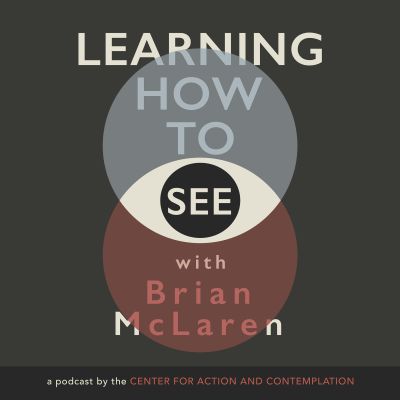How do we transform and transcend our biases? From judgments made unconsciously to complacency in systemic evil, we must learn how to see if we are to learn how to transform. Center for Action and Contemplation faculty member Brian McLaren hosts the podcast series Learning How to See. Listen and discover how seeing is social, political, and contemplative.
https://www.cac.org
Gesamtlänge aller Episoden: 1 day 7 hours 52 minutes
episode 2: 2: Going Against the Flow
On this episode of Learning How to See, Brian, Gigi, Mike and Paul talk about the next three biases that look at the social dimensions of seeing: Community bias: It is very hard to see something your group doesn’t want you to see. This is a form of social confirmation bias. Complementarity bias: If people are nice to you, you’ll be open to what they see and have to say. If they aren’t nice to you, you won’t. Contact bias: If you lack contact with someone, you won’t see what they see...
episode 1: 1: The Big Ditch
On this introductory episode for Season 2 of Learning How to See, Brian, Gigi, Mike and Paul review the biases and talk about two biases that set the stage for all the others: Confirmation Bias: the human brain welcomes information that confirms what it already thinks and resist information that disturbs or contradicts what it already thinks. Complexity Bias: the human brain prefers a simple lie to a complex truth...
episode 1: Coming Soon: Season 2
What could happen if we approached the world in silent wonder, with a humility and openness to learning? Brian McLaren is back for Season 2 of this powerful podcast unpacking the biases that impact the way we see—and ultimately love—ourselves and each other. From judgments made unconsciously to complacency in systemic evil, we must learn how to see if we are to learn how to transform...
episode 6: 6: Seeing, Doubt, Contemplation and Action
On this last episode of Learning How to See, Brian, Jacqui, and Richard review of the biases, and reflection on how doubt, action, and contemplation enrich our ability to see. Resources: The transcript for this episode. Brian's e-book: Why Don't They Get It? Connect with us: We’d love to hear your thoughts, comments or feedback. Send us an email at podcasts@cac.org Center for Action and Contemplation: Facebook | Instagram | Twitter Brian McLaren: Facebook | Instagram | Twitter Rev...
episode 5: 5: What You Focus on Determines What You Miss
On this episode of Learning How to See, Brian, Jacqui, and Richard talk about the next three biases that look at the social-political dimensions of seeing: Comfort/Complacency/Convenience Bias: Our brains welcome data that allows us to relax and be happy and reject data that require us to adjust, work, or inconvenience ourselves. Catastrophe/Normalcy Bias: Our brains notice sudden changes for the worse, but we easily miss slow and subtle changes over time...
episode 4: 4: What Authoritarian Leaders See
On this episode of Learning How to See, Brian, Jacqui, and Richard talk about the next two biases that look at the social-political dimensions of seeing: Confidence Bias: We mistake confidence for competence, and we are all vulnerable to the lies of confident people. Our brains prefer a confident lie to a hesitant truth. Conspiracy Bias: When we feel shame, we are vulnerable to stories that cast us as the victims of an evil conspiracy by some enemy “other...
episode 3: 3: Seeing is Political
On this episode of Learning How to See, Brian, Jacqui, and Richard talk about the next three biases that look at the social-political dimensions of seeing: Conservative/Liberal bias: Conservatives and Liberals see the world differently. Liberals see through a “nurturing parent” window, and Conservatives see through a “strict father” window...
episode 2: 2: Seeing Is A Social Act
On this episode of Learning How to See, Brian, Jacqui, and Richard talk about the next three biases that look at the social dimensions of seeing: Community bias: It is very hard to see something your group doesn’t want you to see. This is a form of social confirmation bias. Complementarity bias: If people are nice to you, you’ll be open to what they see and have to say. If they aren’t nice to you, you won’t. Contact bias: If you lack contact with someone, you won’t see what they see...
episode 1: 1: Why Can't We See?
On this introductory episode of Learning How to See, Brian, Jacqui, and Richard talk about two biases that set the stage for all the others: Confirmation Bias: the human brain welcomes information that confirms what it already thinks and resist information that disturbs or contradicts what it already thinks. Complexity Bias: the human brain prefers a simple lie to a complex truth. Resources: The transcript for this episode...
episode 1: Coming Soon: Learning How to See
How do we transform and transcend our biases? From judgments made unconsciously to complacency in systemic evil, we must learn how to see if we are to learn how to transform. Center for Action and Contemplation faculty members Brian McLaren and Richard Rohr join Rev. Dr. Jacqui Lewis Ph.D. of New York’s Middle Church for this special six-episode podcast series Learning How to See. Listen as these three powerful public theologians discuss how seeing is social, political, and contemplative...
